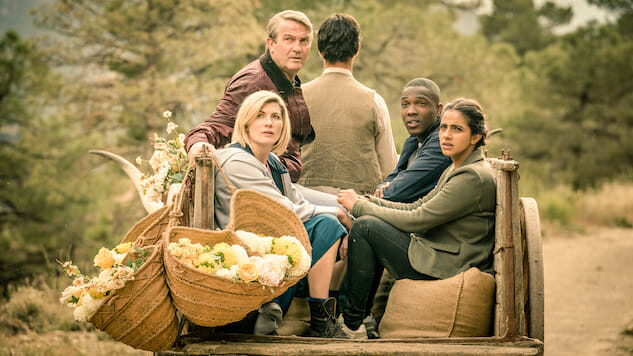“Demons of the Punjab” Proves That Chris Chibnall’s Doctor Who Is Best When It Dives Into the Past
(Episode 11.06)
Photo: Ben Blackall/BBC America
Matt Brennan and Josh Jackson review Doctor Who each week in a series of letters.
Josh,
Ask and ye shall receive! Last week, during our conversation about the disappointment of “The Tsuranga Conundrum,” you mentioned that you hoped to see a Yaz-centric episode, and “Demons of the Punjab” delivers: At Yaz’s (Mandip Gill) request, the Doctor (Jodie Whittaker) directs the TARDIS to Lahore, and it lands the crew in the midst of the partition of India in 1947.
Though the subject matter is quite different, the episode follows much the same template as “Miss Rosa,” in which the science-fictional adversaries—in this case, a species of demon assassins—pale in comparison to the historical ones. (As the Doctor explains at one point, the division of the subcontinent into India and Pakistan led to the deaths of more than one million people and the displacement of an another 10 million on top of that, not to mention sociopolitical tensions between the two countries that continue to this day.) And, as with “Miss Rosa,” I thought this episode was a stunner, rich and resonant for both the star-crossed romance between Yaz’s Muslim grandmother, Umbreen (Amita Suman), and her Hindu first love, Prem (Shane Zaza), and for its mournful sense of all that’s lost when we wall ourselves off from our neighbors. “We didn’t change when a line was drawn,” Prem claims. “But we did,” his brother, Manish (Hamza Jeetooa), replies. In a way, they’re both right, and “Demons in the Punjab” is very astute on this tension between personhood and nationhood.
On the 100th anniversary of the armistice that ended the First World War, as nationalism and its dire consequences are once again in the forefront of our thoughts, it’s hard to fathom a more fitting episode. I think we can safely say that period drama is this Doctor Who’s strong suit?
—Matt

Matt,
Yes, we got both some meaningful scenes for Yaz and another example of how Doctor Who often shines brightest when its light points toward humanity’s past, in this case a past that most of its viewers aren’t intimately familiar with. The idea that neighbors who’ve lived in harmony all their lives can find themselves at violent odds over religion or ethnicity is, unfortunately, something we’re doomed to repeat without constant vigilance. And for a British show to acknowledge its nation’s complicity (at least somewhat here) is admirable.
And while the show’s limited budget precluded actual filming in Lahore (the Spanish town of Aldeire served as a substitute), diving into Yaz’s familiar past paid dividends in emotional impact and character development. And while the alien assassins-turned-witnesses was a bit tidy, it was also a lovely bit of optimism that an entire species can grow and change.
Not to be greedy, but at some point, we’ve got to learn enough about Ryan (Tosin Cole) to care about his character. Graham (Bradley Walsh) is already pretty established as a kindly grandfather figure full of wisdom for all he encounters. He quickly shed his timidity, and even the Doctor listens to him here, convincing her beyond her sense of caution, that Yaz should stay and see the wedding.
The tone of this season, despite tackling things like racism and genocide, is somewhat lighter and more straightforward than when Steven Moffat was at the helm. The Doctor’s baggage of guilt and lost seems to have been mostly shed, though I’m sure we’ll see some of her own demons before too long.
So, I’ve hinted at all the varying tones and genres this show can explore. Is there anything you’re most curious to see next?
—Josh

Josh,
My answer to your question dovetails with your concerns about Ryan, and perhaps the tone of Chibnall’s Who overall. I am no evangelist for serialization, but I do wonder about what a multi-episode arc, even a cliffhanging two-parter, might look like—and how it could be used to deepen our understanding of the characters. (I know this isn’t terribly common, based on what you’ve written so far this season; it’s possible I’ve been watching too much Grey’s Anatomy.)
There’s something about the speed with which the episodes introduce and dispense with adversaries, not all of them terribly compelling to begin with, that makes it hard to get a grip on how our heroes act under duress. And it’s when characters are truly tested that we learn what they’re made of: It’s easy for the Doctor to say “Love is a form of hope, and like hope, love abides,” but what would come of that belief when she faces a more hopeless situation? Would the patched-up relationship between Ryan and Graham survive truly dire circumstances? Would Yaz, the aspiring police officer, step up in a pinch?
It’s not that the episodic structure can’t pose (and answer) these questions. It’s that, six episodes in, I haven’t seen evidence of it yet, and hope there’s some structural tinkering awaiting us in the closing stages of the season. The pieces of the perfect iteration of Doctor Who for dark days are there, I think, but Chibnall and co. are going to have to devise a worthy villain, and some conflict within or among our heroes, to put all those pieces together.
—Matt







































